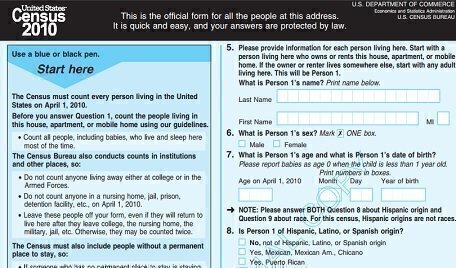Lawyers on both sides of the constitutional controversy over asking everyone in America, during next year’s census, about their citizenship moved Thursday to set the stage for a final Supreme Court ruling before summer. That was the aim of separate but related filings in the Supreme Court and in a federal trial court in New York City.
 The Justices already had planned to rule during their current term on whether top Trump Administration officials could be forced to personally explain why they wanted the question asked. A hearing on that issue is currently set for next month.
The Justices already had planned to rule during their current term on whether top Trump Administration officials could be forced to personally explain why they wanted the question asked. A hearing on that issue is currently set for next month.
But that is not the core of the dispute, so even a ruling on that would have been decidedly preliminary to the main event – that is, the ultimate test of whether it would be illegal to put a citizenship question on the census form going to every household in America. Thursday’s developments pushed toward that ultimate legal reckoning.
The states, cities, and private organizations that are claiming that it would be illegal to ask the citizenship question urged the Justices to dismiss the pending, narrower dispute and await an Administration appeal on the core question.
Meanwhile, in New York City, Trump Administration lawyers filed papers in the trial court of District Judge Jesse M. Furman, formally declaring their plan to pursue such an appeal. On Tuesday, Judge Furman had blocked the citizenship question, ruling that the Administration has no legal authority to ask it and finding that it would seriously impair the accuracy of the population count if it were asked.
Households where Hispanics and non-citizens live would be deterred — out of fear that some of them could be deported — from answering that question, meaning that thousands and maybe millions of people would go uncounted, according to the ruling. Because the Constitution requires that everyone in the U.S. must be counted, an under-count, if it happened, would affect allocation among the states of seats in the U.S. House of Representatives (that is based on states’ population totals), future redistricting of legislatures, and the distribution of some $700 billion in federal funds.
Under normal federal court procedures, the Administration’s appeal of Judge Furman’s decision would go to the U.S. Court of Appeals for the Second Circuit. But, since the Census Bureau has said it needs to know by this June what it is to put on the census questionnaire, it appears that there is only time enough left for action by the Supreme Court.
Thus, it now seems likely that the Trump Administration will try to get the Supreme Court to step in, bypassing the Second Circuit Court. If the Justices go along with that, the maneuver — unusual but not unprecedented — probably would displace the existing case on the narrower aspect of the census controversy.
With Judge Furman’s new ruling, it has become clearer that Trump Administration officials, since soon after they took office in January 2017, had been planning to test the citizenship of everyone as part of the next census. Once the outlines of that plan became public, a group of states, cities and private organizations sued in Judge Furman’s court in April last year to challenge that use of the census. (Other, similar suits were filed in California and Maryland. This week, Furman became the first to rule.)
As the case in New York unfolded, a deep dispute arose over the challengers’ demand that they be allowed to question key government officials to determine whether they had made the plan as a result of discrimination based on ethnic background, with the actual aim of reducing non-citizen and Hispanic participation in the census.
In particular, the challengers wanted to probe the thinking of Commerce Secretary Wilbur Ross, who supervises the Census Bureau and who made the actual decision to query citizenship. It was this pre-trial aspect of the dispute that the Supreme Court agreed, in November, to review this term after temporarily blocking the questioning of Secretary Ross. A hearing was set for February 19.
In their new filing Thursday, the challengers told the Supreme Court that, in their view, nothing remained of that aspect of the controversy, because the trial had since ended and Judge Furman had rejected the citizenship question without any direct testimony of Secretary Ross. With that wrangle ended, the existing case was over, their filing contended.
Any lingering question about how the case was handled by Judge Furman could be considered, the challengers said, if the government moved to appeal the judge’s final ruling against a citizenship question.
That was the process that got started when Administration lawyers told Judge Furman formally that they were going to appeal.
Technically, their appeal must first be actually pending at the Second Circuit Court before the Administration would be free to ask the Supreme Court to take over. That step can be taken very quickly.
The Justices probably would not dismiss the existing case without first getting a response on that from the Administration. Events are sure to unfold rapidly from here on, because of the time pressures facing the Census Bureau.
Lyle Denniston has been writing about the Supreme Court since 1958. His work has appeared here since mid-2011.







